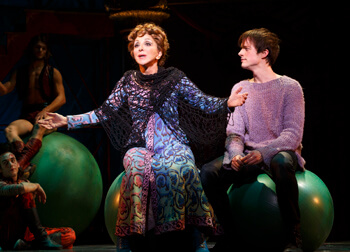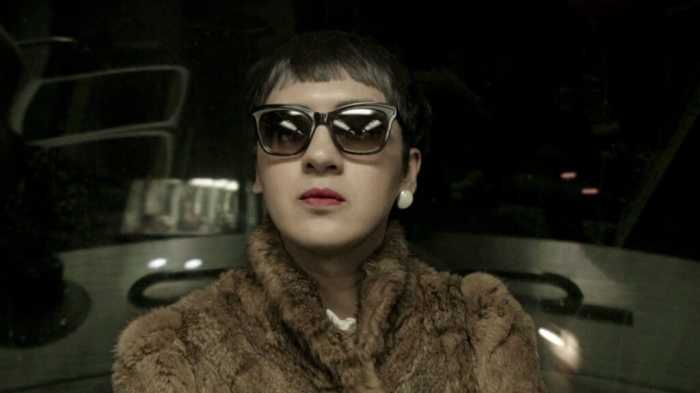Vanessa Williams, Cicely Tyson, and Cuba Gooding, Jr. in Horton Foote’s “The Trip to Bountiful.” | JOAN MARCUS
Longing permeates the plays of Horton Foote. Whether his characters are pining for a parent, a connection, or, in the case of “The Trip to Bountiful,” a lost home, Foote’s ability to dramatize the inescapably human, existential unease we all feel is his unique gift. He sets his plays in and around the fictional town of Harrison, Texas, but the emotional truths he explores are the same in Manhattan… and Manhattan, Kansas.
The centerpiece of this new production is Cicely Tyson’s luminous performance as Carrie Mae, who due to advancing age and declining health must live in Houston with her son, Ludie, and her daughter-in-law, Jessie Mae. Carrie Mae feels confined in their two-room apartment and aches to return to her hometown of Bountiful. Jessie Mae — who herself feels the limitations of life in Houston, longing for something more glamorous like what she reads about in her movie magazines — is stuck caring for Carrie Mae while Ludie works. Carrie Mae has tried to escape, but never gets very far until the day Jessie Mae ducks out to meet her sister. When Carrie Mae makes a break for it, therein lies a play.
Carrie Mae gets as far as Harrison on a bus, only to find that Bountiful, never more than a bend in the road, has been erased by time. Though her home still stands, it is tumbling down, and the play centers on the way she rediscovers herself during the trip. We hear stories from Carrie Mae’s life as she tells them to Thelma, whom she meets on the bus. In time, Carrie Mae is found and must go back to Houston, but not before revisiting her original home — at least in her heart — gaining sustenance that may stay with her the rest of her life.
“Bountiful,” “Pippin” are wonderful theatrical journeys; Cummings’ “Macbeth” stumbles over its concept
To watch Tyson’s transformation as she leaves Houston and returns to what’s left of Bountiful is the stuff of theatrical legends. In it, we see the visceral, healing power home holds for her. We watch as decades drop away, witnessing the joy and love that define Carrie Mae’s true self.
Tyson plays brilliantly against Vanessa Williams as Jessie Mae. Williams, who looks smashing and sophisticated in Broughton Ramsey’s wonderful clothes, is not the shrew she seems but just another person hoping for something else. When she makes an uneasy truce with Carrie Mae by the end, Jessie Mae finally opens her heart just enough to discover the essentially good person inside her and to understand her conflict with her husband’s mother. Cuba Gooding, Jr. makes an impressive Broadway debut as a man torn between his mother and a wife who craves peace of mind. Condola Rashad is delightful as Thelma, giving what could be a one-note part an impressive level of complexity and subtext.
Director Michael Wilson strikes just the right tone. It’s impossible not to care for and relate to all the characters and feel their longing. So engaged was the audience the night I saw it that when Tyson started singing a hymn, many members of the audience sang along. Set in a backwater bus depot, the scene transported them to an entirely different place.
Alan Cumming in his one-man production of “Macbeth.” | JEREMY DANIEL
If you know Shakespeare’s “Macbeth” backwards and forwards, you may be able to follow Alan Cumming’s 90-minute version of it set in an insane asylum. If not, you won’t be blamed for nodding off — or be the only one who did.
While this is designed to be a tour-de-force for Cumming, who is a galvanizing stage presence, the concept collapses under its own weight because we have no idea who this man in the asylum is or why he would suddenly start spouting Shakespeare. Cumming speaks with passion and no one will question his commitment to the roles he portrays, but he often muddies the distinction between his characters. Why he needs to pull the entrails out of a bird is unclear. (Perhaps a nod to the augury of the Weird Sisters — but I’m really just making that up.)
Concept theater is all well and good, but if it doesn’t communicate, it becomes hollow, even superfluous. It would have been far better for Cumming to simply do the play without ill-conceived trappings and let his gifts and Shakespeare’s genius create a more simple and affecting magic.
Andrea Martin and Matthew James Thomas in Diane Paulus’ production of “Pippin.” | JOAN MARCUS
When the chorus at the opening of “Pippin” sings, “We’ve got magic to do,” they ain’t kidding. For the next two-plus hours, Diane Paulus’ magnificent production is a gasp-inducing, joy-filled spectacle that dazzles the senses and touches the heart. The true magic, though, comes from giving this slight show substance and an emotional core. What was, in the original, merely light entertainment with a cynical edge and an anti-war message about a boy who can’t find himself becomes a psychological exploration about the path to self-actualization and acceptance of the world on its terms. The ending is quite moving and inspired, going, like Paulus’ other work, straight to the heart of the matter.
This production’s other shining achievement is its perfect casting. Matthew James Thomas has a wonderful, contemporary voice that works with the songs to keep them new, giving a fresh perspective to standards like “Corner of the Sky” and “Extraordinary.” Patina Miller is phenomenal as the Leading Player, a character symbolic of the conflicts Pippin confronts. Her precise dancing and laser focus are unforgettable.
Rachel Bay Jones as Catherine, the woman Pippin falls in love with, gives a performance of sustained and understated comedy, which is juxtaposed against the first real feeling Pippin must confront. And Andrea Martin as Berthe, the granny who’s not going gently into that good night — or anywhere, for that matter — stopped the show with “No Time at All.” For all Berthe’s derring-do, Martin is also touching in portraying a woman who, nearing the end of life, holds on with a joyful ferocity.
Chet Walker’s splendid choreography pays homage to Bob Fosse’s original style, while integrating it with the contemporary athleticism that Gypsy Snider’s circus troupe brings to the production.
Productions of “Pippin” over the years have suffered from being dated and inaccessible. Paulus and company, however, have given this revival a welcome and beguiling shot in the arm.
THE TRIP TO BOUNTIFUL | Stephen Sondheim Theatre | 124 W. 43rd St. | Tue.-Thu. at 7 p.m.: Wed.-Sat. at 8 p.m.: Wed., Sat. at 2 p.m.: Sun at 3 p.m. | $37-$142 at telecharge.com or 800-432-7500
MACBETH | Ethel Barrymore Theatre | 243 W. 47th St. | Through Jul. 14: Mon.-Tue., Thu. at 7 p.m.: Fri., Sat. at 8 p.m.; Sun. at 3 p.m. | $69.50-$135 at telecharge.com or 212-239-6200
PIPPIN | The Music Box | 249 W. 45th St. | Tue.-Sat. at 8 p.m.; Wed., Sat. at 2:30 p.m.; Sun. at 3 p.m. | $59-$142 at telecharge.com or 800-432-7500








































